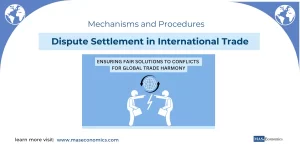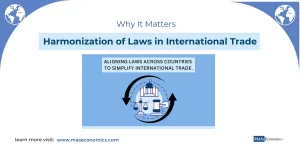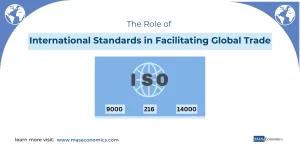Artificial intelligence (AI) has emerged as a critical tool in transforming global trade dynamics in recent years. AI in international trade has become instrumental in facilitating trade by optimizing logistics, improving supply chain management, and offering real-time data analysis. This transformation extends to the integration of AI in the strategic decision-making of firms, reshaping foreign direct investment (FDI) patterns and global competition. As digital economies evolve, AI in international trade influences trade flows, competition, and investment decisions, becoming increasingly apparent.
AI and Trade Flows
AI in international trade has significantly streamlined processes, making cross-border transactions more efficient. These advancements include predictive analytics, which allows firms to anticipate demand trends and adjust supply chains accordingly. AI-based logistics platforms enhance route optimization and inventory management, reducing costs and transit times for exports and imports. By leveraging these technologies, companies can navigate the complexities of global trade with greater agility, ensuring timely deliveries and adapting to shifts in demand.
Moreover, AI in international trade enables the analysis of large datasets, such as market trends, consumer behavior, and trade tariffs. This helps businesses identify new export opportunities and mitigate risks associated with volatile markets. The ability to process and interpret vast amounts of data gives firms a competitive edge in identifying potential trade partners and optimizing their market entry strategies.
AI’s Impact on Competition in the Global Market
The rise of AI in international trade has reshaped the competitive landscape. Digital economies that harness AI technology effectively are better positioned in the global market, as AI offers capabilities like automated decision-making, enhanced customer insights, and precision targeting of market segments. This technological advantage allows companies to respond swiftly to consumer preferences, regulatory shifts, and competitive pressures.
AI in international trade also enables strategic pricing and personalized marketing, helping businesses differentiate themselves and capture market share. For example, AI-powered tools can adjust prices dynamically based on real-time data from international markets, ensuring that companies remain competitive across different regions.
AI and Foreign Direct Investment
The influence of AI in international trade extends beyond trade flows to shape the patterns of foreign direct investment (FDI). As firms increasingly seek to establish a presence in digital economies, AI has become a key determinant of investment decisions. Countries that integrate AI into their economic strategies become more attractive to investors, as AI technologies can enhance productivity, reduce operational costs, and provide insights into market trends.
AI in international trade contributes to FDI by enabling companies to analyze potential markets more effectively. Firms can assess market conditions, regulatory environments, and consumer preferences through advanced data analytics before making investment decisions. This reduces the uncertainty of entering new markets and allows companies to allocate resources more efficiently. Additionally, AI-driven automation helps streamline regulatory compliance, making it easier for multinational corporations to navigate the legal complexities of different countries.
Digital Economies and the Globalization of AI
The globalization of AI in international trade has led to increased competition among digital economies, particularly in sectors like e-commerce, fintech, and advanced manufacturing. These economies leverage AI to develop sophisticated digital platforms that facilitate international trade and attract FDI. The competitive edge gained through AI allows these countries to position themselves as hubs for technological innovation and global trade.
AI in international trade supports the integration of regional and global value chains by improving the efficiency of production and distribution processes. For example, AI-powered predictive maintenance systems can reduce manufacturing downtime, making digital economy industries more reliable partners in global supply chains.
AI-Driven Policies and Their Impact on Global Trade
Governments in digital economies increasingly adopt AI-driven policies to enhance their competitive position in the global market. These policies often focus on creating a conducive environment for AI development, such as investing in digital infrastructure, fostering innovation through research and development, and ensuring regulatory frameworks that support AI integration.
Such policies attract FDI and promote technological transfer, allowing domestic firms to access advanced AI in international trade through partnerships with multinational companies. This transfer of knowledge and technology contributes to the broader development of the local economy, enabling it to compete more effectively in international markets.
Challenges in Adopting AI for International Trade and FDI
Integrating AI in international trade and investment processes comes with challenges despite its potential. One of the primary issues is the digital divide between developed and developing economies. While some countries have made significant strides in AI adoption, others face barriers such as limited digital infrastructure, insufficient technical expertise, and restrictive regulatory environments.
Additionally, concerns around data privacy, cybersecurity, and the transparency of AI algorithms pose risks to the seamless integration of AI in international trade. Addressing these challenges requires international cooperation to establish common standards and best practices for the ethical use of AI in economic activities.
The Future of AI in Shaping International Trade Dynamics
As AI in international trade continues to evolve, its role in shaping global trade dynamics will become even more pronounced. Emerging trends, such as AI-enabled digital trade platforms and blockchain-based supply chain solutions, can potentially transform how global trade is conducted. These technologies can enhance transparency, reduce transaction costs, and provide real-time insights into market conditions, making international trade more accessible and efficient.
Moreover, as countries invest in AI in international trade to enhance their competitiveness, the global trade landscape will likely see shifts in trade patterns, with digital economies becoming central players in the global market. Adapting to these changes and leveraging AI’s capabilities will be crucial for countries and businesses seeking to maintain their competitive edge in an increasingly digital world.
Conclusion
AI in international trade is reshaping the dynamics of global trade and investment, offering new opportunities for efficiency, innovation, and growth. AI has become a vital component of the digital economy by facilitating smoother trade flows, enhancing competitiveness, and attracting FDI. However, realizing its full potential requires addressing the challenges of digital inequality and ensuring that AI technologies are deployed ethically and inclusively.
FAQs:
How is AI used in international trade?
AI in international trade is used to optimize logistics, improve supply chain management, and provide real-time data analysis. It helps businesses streamline cross-border transactions, reduce costs, and identify new export opportunities.
What impact does AI have on global competition?
AI enhances global competition by providing businesses with advanced tools for automated decision-making, strategic pricing, and customer insights. This allows companies to respond quickly to changes in market conditions and maintain a competitive edge.
How does AI influence foreign direct investment (FDI)?
AI influences FDI by helping companies analyze potential markets more effectively. It reduces uncertainties in new markets and enhances productivity, making countries with robust AI capabilities more attractive to investors.
What are the challenges of adopting AI in international trade?
Key challenges include the digital divide between developed and developing economies, data privacy concerns, and the complexity of integrating AI with existing trade processes. Addressing these requires international cooperation and standards for AI use.
What is the future of AI in international trade?
The future of AI in international trade includes the development of AI-enabled trade platforms, blockchain integration for supply chain transparency, and greater adoption of AI technologies by digital economies. These trends are expected to reshape global trade patterns.
Thanks for reading! Share this with friends and spread the knowledge if you found it helpful.
Happy learning with MASEconomics




